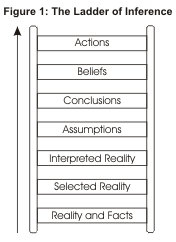Interpersonal Communication - The Ladder of Inference

The Ladder of Inference describes the thinking process that we go through, usually without realizing it, to get from a fact to a decision or action. The thinking stages can be seen as rungs on a ladder
Example from mindtools:
The regional Sales Manager has just read the latest sales figures. Sales in Don’s territory are down - again. It’s simply not good enough. He needs to be fired!
Most people would agree that the Sales Manager may have just jumped to a rash conclusion. So let’s see how the scenario plays using the Ladder of Inference:
The latest month’s sales figures (reality) have come in, and the Sales Manager immediately focuses on Don’s territory (selected reality). Sales are down on the previous months again (interpreted reality). The Sales Manager assumes that the drop in sales is entirely to do with the Don’s performance (assumption), and decides that Don hasn’t been performing well (conclusion). So he forms the opinion that Don isn’t up to the job (belief). He feels that firing Don is the best options (action).
Now let’s challenge the Sales Manager’s thinking using the Ladder of Inference:
The Sales Manager came to the sales figures with an existing belief that Don, a new salesmen, couldn’t possibly be as good as the "old-timers" who he has trained for years. He focused on Don’s territory because Don is the newest salesman, and selected facts that supported what he already believed (that Don wouldn’t be doing a good job).
To get back to facts and reality, we must challenge the Sales Manager’s selection of data and his assumptions about Don’s likely performance.
Although the figures are down in Don’s territory, they have actually dipped less than in other areas. Don is actually a great salesman, but he and his colleagues have in fact been let down by new products being delayed, and by old products running out of stock.
Once the Sales Manager changes his assumptions, he will see the need to focus on solving the production issues. He can also learn from Don – how is it that Don has performed better than other sales people in the face of stock problems? Can others learn from him?

0 Comments:
Post a Comment
<< Home